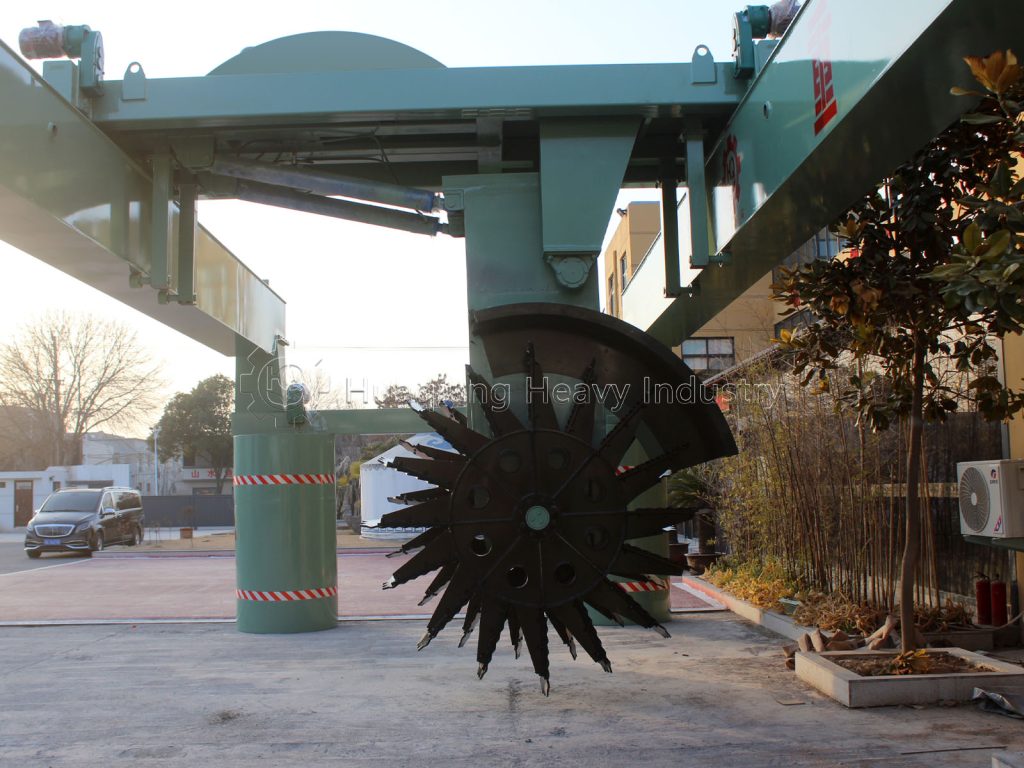Equipment Overview
The large wheel-type compost turner is a crucial piece of equipment in modern organic fertilizer production, specifically designed for large-scale organic waste processing. This innovative machinery continuously turns, lifts, and disperses piled organic materials through a rotating wheel with a diameter that can reach several meters and turning teeth along its edge. This movement ensures thorough contact between materials and air, effectively regulating temperature and humidity, creating an ideal environment for microbial decomposition, thereby accelerating the maturation process.
Compared to traditional trough-type or crawler compost turners, the large wheel-type turner is particularly suitable for organic fertilizer production bases with an annual capacity of over 10,000 tons. Its continuously rotating large wheel design provides extensive coverage and exceptional processing efficiency, significantly reducing labor and time costs for large-scale fermentation operations.
Diversity of Processable Materials
The large wheel-type compost turner has powerful processing capacity and can efficiently ferment various organic materials. It can handle livestock manure such as chicken, pig, and cattle manure, eliminating pathogens, insect eggs, and weed seeds through high-temperature fermentation. The equipment can also process crop straws like corn, wheat, and rice straw, promoting the degradation of cellulose into organic matter.
Furthermore, this equipment is suitable for industrial organic waste, including distiller’s grains, sugar residue, and medicinal residues, reducing moisture and promoting microbial growth through continuous turning. Urban sludge and garden waste, such as dead branches and fallen leaves, can also be processed by this equipment into safe organic fertilizers, achieving resource recycling.
Core Components and Technical Features
The large wheel-type compost turner operates through the coordinated work of multiple precision components. The main rotating disk, as the core working part, is welded from high-strength steel with a typical diameter of 5-10 meters. The turning teeth, made of wear-resistant alloy steel, are distributed along the edge of the disk and are responsible for turning and dispersing materials from the bottom up.
The equipment’s travel mechanism ensures smooth movement in the fermentation area, while the power system provides the necessary driving force. The support structure bears the combined weight of the wheel and materials, and the electronic control system enables automated operation and real-time monitoring. Auxiliary devices such as spray systems, lighting equipment, and dust covers further enhance the equipment’s functionality and environmental friendliness.

Fermentation Process
The organic fertilizer production process using a large wheel-type compost turner follows a systematic procedure. First, raw materials undergo pretreatment, including solid-liquid separation, crushing, and mixing, to achieve appropriate carbon-to-nitrogen ratio and moisture content. The pretreated materials are then piled into large windrows, 5-8 meters wide, 1.5-2 meters high, and up to 100 meters long.
During the turning fermentation stage, the equipment moves slowly along the windrows while the wheel rotates at high speed, with the turning teeth lifting, dispersing, and repiling the materials. The fermentation process is divided into initial, high-temperature, and cooling phases, with the entire cycle lasting about 20-30 days. Finally, the maturity level is determined by observing temperature, color, texture, and odor, and qualified products are sent to subsequent processing stages.
Global Applications and Environmental Significance
The application of large wheel-type compost turners is becoming increasingly widespread globally, providing sustainable solutions for organic waste management. It not only transforms waste into valuable resources but also reduces environmental pollution, supporting the development of a circular economy. As global attention to sustainable agriculture and environmental protection increases, this efficient equipment will play an even more important role in the future.
Conclusion: Integrated Approach to Organic Fertilizer Production
The large wheel compost turner represents a cornerstone technology in modern organic fertilizer production line systems, playing a vital role in the organic fertilizer fermentation process. As a key fertilizer production machine, this equipment significantly enhances the efficiency of fermentation composting technology for organic fertilizer compared to alternatives like the chain compost turner. The complete bio organic fertilizer production line integrates multiple specialized equipments required for biofertilizer production, with the large wheel compost turning machine serving as the fundamental component for the initial fermentation stage.
Following successful organic fertilizer fermentation, the material progresses through subsequent processing stages including the disc granulation production line where specialized fertilizer granulator equipment transforms fermented organic matter into uniform pellets. Each fertilizer making machine in the production chain contributes to converting organic waste into valuable agricultural inputs. The comprehensive compost fertilizer machine system demonstrates how advanced technology can transform waste management while supporting sustainable agriculture through efficient organic fertilizer manufacturing processes.
